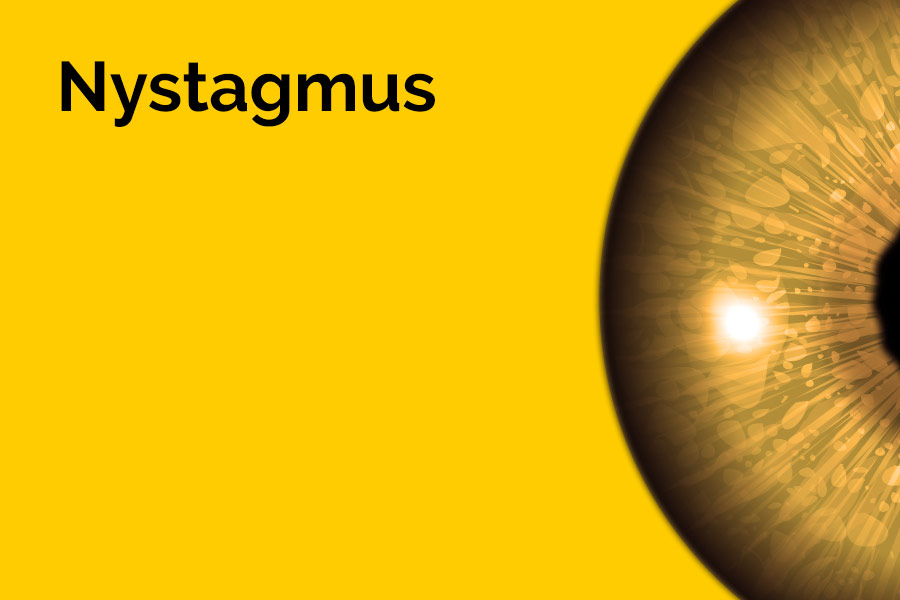Nystagmus
Nystagmus is a condition that causes rhythmical, repetitive and involuntary movement of one or both of the eyes. It is usually a side to side movement, however, can sometimes be up and down or in a circular motion.
Symptoms
Nystagmus affects people in different ways and the effects vary greatly from one person to the next. In all cases, vision will become distorted.
The majority of people have the condition since childhood are not affected by a constantly moving image (known as an ‘oscillopsia’), as their brain adapts to the movement of their eyes. However, people who acquire nystagmus later in life are unlikely to adjust so well and will be much more affected by oscillopsia. Nystagmus is also associated with reduced sight. The degree of sight loss varies from mild to extremely poor vision and is related to the underlying condition. Many people with the condition are eligible to be registered as partially sighted or blind.
People with nystagmus may tire more easily than other people because of the extra effort involved at looking at things.
Many people with nystagmus can read very small print if it is close enough to their eyes, some find a visual aid such as a magnifier helpful.
People with nystagmus may be slower readers because of the extra time needed to scan the page.
Many people with nystagmus use a computer as they can position screens to suit their own needs and adjust brightness, character size etc. The angle of vision is very important. Many people with nystagmus have a ‘null point’ where the eye movement is reduced and the vision is improved.
Uncontrolled head nodding helps concentration probably because the head movement compensates somewhat for the eye movement.
Depth perception is often considered reduced. This may sometimes make people seem a little slower or clumsier than normal.
Balance may also be affected, possibly due to poor depth conception, which can make it difficult to use stairs or cross uneven surfaces.
Diagnosis, Screening and Tests
Nystagmus can be diagnosed through a comprehensive eye exam. Your healthcare provider will ask you questions regarding your symptoms, medical history, and family history before performing a physical exam. The physical exam generally involves looking at your nerves system and inner ear.
During parts of the neurological exam, you may be asked to wear Frenzel glasses, which are goggles that illuminate and magnify your eyes. Your doctor may ask you to spin in a circle for thirty seconds, stop, and then try to stare straight at an object.
If you suffer from a certain form of nystagmus, your eyes will move slowly in one direction, and then move rapidly in the opposite direction. Additional diagnostic testing may include:
- CT scan and/or MRI of your head
- Vestibular testing that records the movements of your eyes and response to stimulation
- Electrooculography, which uses tiny electrodes to measure your movements
Nystagmus is often the result of other underlying health problems, therefore, your eye doctor may refer you to your primary care physician or other medical experts for further tests.
Treatments
Unfortunately, the actual movement of the eyes caused by nystagmus can’t be cured but some things may help with managing the symptoms:
- Glasses, contact lenses and low vision aids are not able to correct nystagmus but having clear vision can help to slow eye movements
- Occasionally surgery can be performed to alter the position of the muscles that move the eye so that it’s more comfortable to keep your head in the best position. Surgery cannot be used to completely correct or cure your nystagmus.
- Drugs can sometimes be used to help reduce your awareness of the constant eye movements
Prevention
Unfortunately, nystagmus cannot be prevented. Acquired nystagmus may be reduced by a prompt treatment of underlying neurological conditions. Medications such as anti-epilepsy drugs that may cause nystagmus as a side effect should be taken as instructed by a health care provider to reduce the risk of development of this eye condition.
